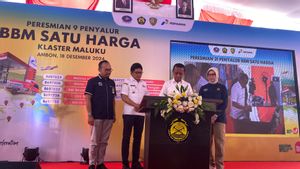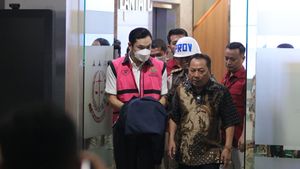JAKARTA - Epidemiologist from the Center for Environmental and Population Health at Griffith University Australia, Dicky Budiman, said tightening the 3T, 5M health protocols, and accelerating vaccinations were still needed to anticipate the surge in positive cases of COVID-19.
According to him, the worsening of the pandemic situation in Europe and Asia is a signal that the program needs to be tightened considering that 40 percent of the total population in Indonesia has not been vaccinated.
"Currently, a number of countries in the world are experiencing an increase in COVID-19 cases, such as in Europe and China. Even though they have intensively carried out vaccinations, they are now overwhelmed by the rising rate of virus infections," said Dicky in the webinar "Inputting the COVID-19 Control Roadmap" which was monitored in Jakarta, reported by Antara, Friday, November 19.
The decline in positive cases of COVID-19 nationally should not keep the public off guard because the combination of the unvaccinated population, increased mobilization, and the presence of the Delta variant can take a toll.
"Although not as big as the second wave, the third wave of COVID-19 in Indonesia has the potential to occur in the first quarter of 2022, assuming there is no more 'super' variant of Delta circulating in Indonesia.
Therefore, if we are not careful, the naru period becomes a vulnerable moment, so that people's compliance in implementing health protocols must be stricter, especially with high mobility and a shortened quarantine period," added Dicky, who is also the author of the Adaptation Control and Recovery Roadmap. Impact of COVID-19.
Dicky said that the academic paper for the Adaptation Roadmap for Control and Recovery from the Impact of COVID-19 provides guidance on what steps need to be taken by all parties in Indonesia to accelerate the transition from the pandemic to endemic in order to achieve health development targets.
This roadmap reveals six main problems in the Indonesian health sector that need to be mitigated in an effort to recover from the impact of COVID-19, namely the herd immunity threshold that has not been achieved, early detection and prevention, capacity of health facilities when cases spike, adaptive public behavior, coordination and monitoring, and quality. health services that have the potential to decline. This roadmap offers solutions in the form of policies to encourage people to adapt in the midst of COVID-19 so that the health sector can recover quickly.
This is done by increasing vaccinations, communicating the risk of continuing the spread of COVID-19, implementing trace-isolation tests, conducting anti-virus therapy, conducting surveillance, carrying out border control, implementing 5M behavior, improving air quality, providing incentives to health workers, protecting on vulnerable groups, conduct periodic evaluations, strengthen health sector facilities and infrastructure, provide funding and conduct research and health diplomacy.
“The combination of improving vaccination programs and being consistent in adhering to the 5Ms is the most important thing during this pandemic. In addition, policies from the government and information dissemination must always be ensured to the public to remote areas of the country to minimize the impact,” said Dicky.
On the other hand, Dicky believes that handling the COVID-19 pandemic is different from handling natural disasters because pandemics can occur in several waves, so the recovery process is more complicated.
The English, Chinese, Japanese, Arabic, and French versions are automatically generated by the AI. So there may still be inaccuracies in translating, please always see Indonesian as our main language. (system supported by DigitalSiber.id)













